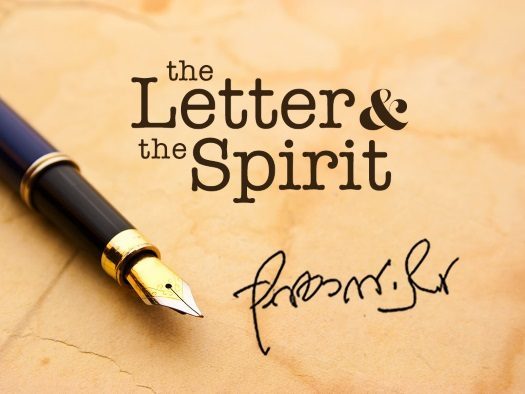
Weekly Letter: Reconciling Freedom of Choice
Entering the month of Elul and in preparation for Rosh Hashanah – when we are inscribed for a good and sweet year – we present a letter in which the Rebbe answers the question: How can Kesivo va’chasimo tova be reconciled with the idea of freedom of choice and action – as this inscription implies predestination? The letter, written originally in English, is from the archives of the Rebbe’s trusted secretary Rabbi Nissan Mindel.
By the Grace of G-d
22nd of Shvat, 5724
Brooklyn, N.Y.
Mr.
Baltimore, Md.
Greeting and Blessing;
I am in receipt of your letter, in which you dwell on the question of Divine foreknowledge and human freedom of action. You also ask how is it possible that the Kesivo va Chasimo Toivo, which implies predestination, can be reconciled with the idea of freedom of action.
As you surely know, much has been written and published on this subject, and it is also difficult to discuss such a topic adequately in a letter. Nevertheless, inasmuch as you have asked the question, I will attempt to give you a few salient points which should help t clear up this problem in your mind.
- The apparent contradiction between Divine knowledge and human freedom comes from the misconceptions of what this Divine knowledge means and is being confused with predetermination and predestination. By way of illustration: when a person knows how another individual acted in the past, obviously this knowledge did not affect the choice of action of that particular individual, whose action preceded that knowledge. Similarly, foreknowledge need not affect the choice of action of an individual. To illustrate this further, let us assume, for the sake of argument, that there is a clairvoyant individual who can foresee a certain action in the future, this foreknowledge would not affect the course of events, inasmuch as they are taking place regardless of the foreknowledge of that clairvoyant individual. A further illustration: a psychologist who knows a very close individual well and for many years could predict what that individual will do in the next few moments or hours, again, this knowledge would not affect the actual behavior of that individual. Now, bearing in mind that G-d’s knowledge is infinitely greater than that of the psychologist in the illustration, it is surely not surprising that He would know in advance, not only for a period of minutes or hours, but months and years.
- Your question how the Kesivo va Chasimo Toiva can be reconciled with the idea of freedom throughout the year inasmuch as a Kesiva va Chasimo Toiva already implies predestination, this question has been particularly dealt with in the Likutei Torah of the Old Rebbe, and more recently, and at greater length in the Kuntres Umaayon of my father-in-law of saintly memory. I am certain that your friends, whom you mention in your letter, have these books.
The essential point here is that the Divine determination of Rosh Hashono and Yom Kippur is one “in potential” which has yet to be actualized. The actual realization of this depends on the Divine judgment which takes place every day, and which depends largely upon the individual’s conduct. The illustration in the above sources is this: suppose an individual was judged on Rosh Hashono and Yom Kippur to attain wealth during the year. “Wealth” can be expressed in a variety of ways, such as wealth of knowledge or other spiritual matters such as intellectual or emotional insights, etc.; it may also be expressed in material things, as commonly understood. The same is true in everything else. The final result is determined by the individual’s own choice of actions and conduct, which come before Divine scrutiny and judgment every day. That is why we have our daily prayer of the Shmone Esre, even though there had already been general judgment on Rosh Hashono and Yom Kippur.
I trust that the above will not only clarify the matter, but will also serve as a reminder that the essential thing is the deed and the daily conduct in the fulfillment of the mitzvoth in the daily life. Moreover, this also gives a greater insight into the understanding of the mitzvoth and the general Jewish outlook on life, which can come not from theoretical speculation about the mitzvoth, but from their actual performance. Here again, the illustration may be found in the physical world: if a person wants to understand the process of digestion and how physical food turns into energy, etc., the way to go about it is not stop eating and drinking, pending the understanding of the process, for this would only weaken the mind and body, and lessen the capacity for understanding. Rather, the opposite is true. It is necessary to sustain the body and strengthen it. The same is true of medicine, where it would be obviously foolish to refuse to take it because of a lack of knowledge how the medicine will help restore good health. So, and much more so, in the case of the Divine Mitzvoth, which must be observed first of all, and the effort to understand them must come later, and must not be a condition of their fulfillment.
With blessing,
By
***
The above letter is from The Letter and the Spirit by Nissan Mindel Publications (NMP).
These letters were written originally in English and were prepared for publication by Rabbi Dr. Nissan Mindel, whose responsibility it was the Rebbe’s correspondence in English and several other languages.
We thank Rabbi Shalom Ber Schapiro, who was entrusted by his father-in-law Rabbi Mindel with his archives and who is Director of the Nissan Mindel Publications (NMP), for making the Rebbe’s letters available to the wider public. May the merit of the many stand him in good stead.












